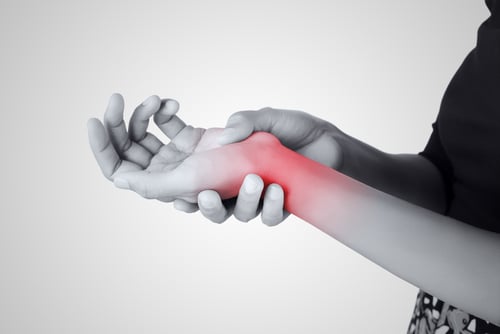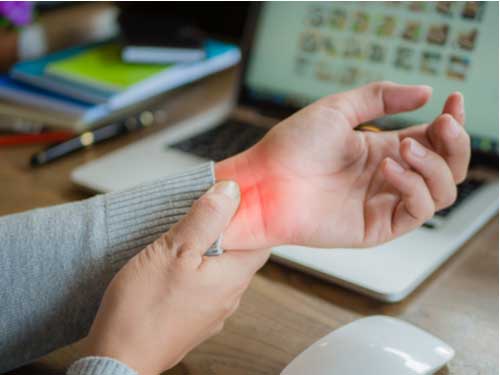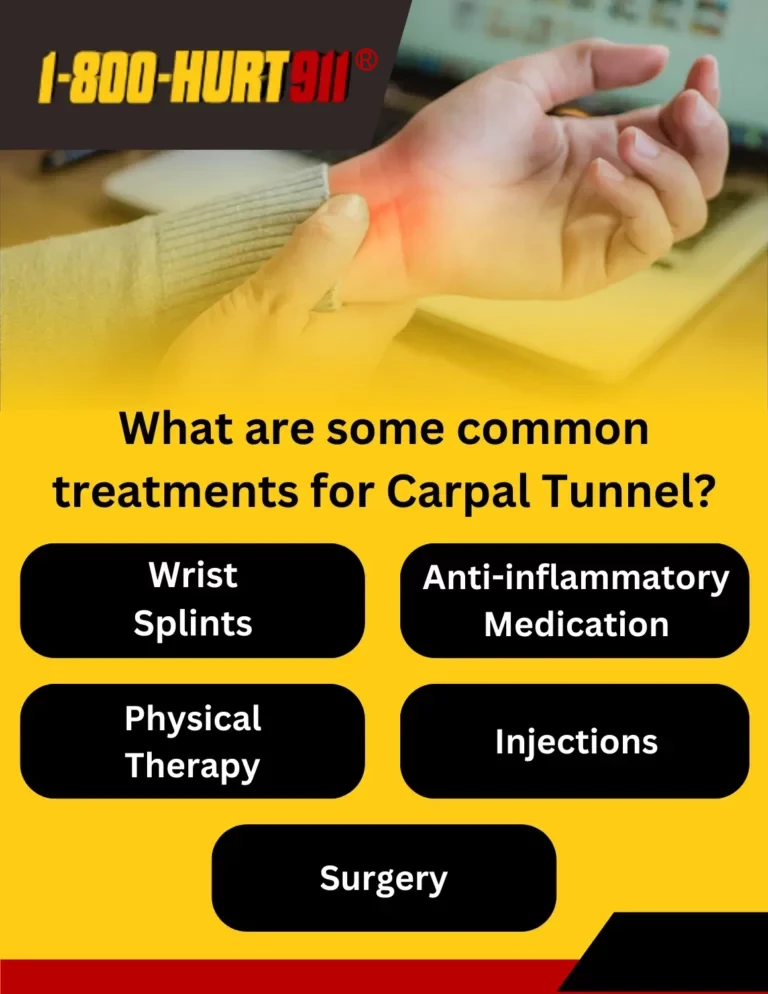Carpal Tunnel Syndrome occurs as a result of tension applied to the median nerve. This is the nerve running starting from the forearm to the palm. When the tendons that are located in the Carpal Tunnel become irritated or thickened and start pressing on the median nerve, that’s when you’ll start exhibiting symptoms of Carpal Tunnel.
In a nutshell, it’s a pinched or squeezed nerve at the wrist. For most people, the pain and other associated symptoms resulting from Carpal Tunnel make it hard to fulfill normal duties. Our carpal tunnel treatment in Atlanta focuses on improving functionality, remedying the cause, and preventing symptoms from arising.
Our physiotherapists in Atlanta are experts with extensive experience when it comes to treating this syndrome. When you visit us at Hurt 911® Injury Centers, we use advanced and minimally invasive treatments to ensure that our patients are relieved of their pain and other associated symptoms and help them proceed with their life.
Talk to our Atlanta specialists to learn more about the condition and what possible treatments are ideal for your case.
Get in touch with our Hurt 911® Injury Centers offices at 404-687-9000 to book an evaluation and receive proper carpal tunnel syndrome treatment in Atlanta before the symptoms get worse.
What Are Some of the Factors that Contribute to Carpal Tunnel Syndrome?
There are an array of factors that have been linked with Carpal Tunnel Syndrome. Though they might not directly contribute to Carpal Tunnel Syndrome, they might step up the risk of damage or irritation to the median nerve.
Some of these factors include:
- Nerve-Damaging Conditions: Chronic conditions like diabetes, increase your chances of nerve damage, which includes injury to your median nerve.
- Medications: Some research studies have indicated a connection between using anastrozole (Arimidex) and Carpal Tunnel Syndrome, a drug utilized for treating breast cancer.
- Anatomic Factors: A wrist dislocation or fracture, or arthritis that distorts the bones found in the wrist, can change the gap in the Carpal Tunnel and subsequently apply pressure to the median nerve. Also, persons with small carpal tunnels have an increased chance of contracting Carpal Tunnel Syndrome.
- Inflammatory Conditions: Rheumatoid arthritis and other associated conditions that contain an inflammatory constituent can impact the tendon lining found in your wrist and compress your median nerve.
- Sex: Generally, Carpal Tunnel Syndrome is more prevalent in women. This is because the carpal tunnel region is smaller in females compared to males. Women who have Carpal Tunnel Syndrome likely have small carpal tunnels compared to women without.
- Body Fluid Changes: Retention of fluid may raise the pressure in your Carpal Tunnel, which in turn irritates the median nerve. This mostly happens during menopause and pregnancy. Carpal Tunnel Syndrome relating to pregnancy typically improves without need for treatment after gestation.
- Obesity: Obesity on its own is a risk factor. It’s recommended to have a healthy diet and do regular exercise.
- Other Medical Conditions: Medical conditions like lymphedema, kidney failure, thyroid disorders, and menopause, increase your likelihood of contracting Carpal Tunnel Syndrome.
- Workplace Factors: Working on an assembly line or operating vibrating tools that need repetitive or extended flexing on the wrist may build up pressure on the median nerve or escalate already existent nerve damage, particularly if the job is done under cold conditions.
What Are Some of the Symptoms of Carpal Tunnel Syndrome?
Symptoms of Carpal Tunnel Syndrome often begin slowly and may include:
Numbness or tingling
You may feel numbness and tingling in your hand or fingers. The most commonly affected parts are the thumb, ring, middle, and index fingers, but not the pinky finger. You may feel an electric shock sensation radiating up your arm. Symptoms are usually experienced while holding a newspaper, paper, or steering wheel, or may wake you up at night.
Most individuals shake out their hands in an attempt of alleviating their symptoms. The numbness may get constant with time.

Weakness
You might start experiencing weakness in your hand(s) and have the tendency of dropping objects. This might be as a result of numbness in your hand or weakness of the pinching muscles in your thumb, which the median nerve controls.
If you’re exhibiting any of the mentioned Carpal Tunnel symptoms, please consider getting Carpal Tunnel Treatment in Atlanta from one of our committed hand doctors at Hurt 911® Injury Centers. We have the knowledge and expertise required to properly handle your needs.
What Are Some of the Common Treatments for Carpal Tunnel Syndrome?
The objective of seeking Carpal Tunnel treatment is to relieve irritation and compression on the nerve such that the associated symptoms end.
Wrist Splints
Utilizing a splint to help in stabilizing the wrist is a common treatment method. Wrist splints help in mitigating night symptoms of numbness and tingling that may inhibit your sleep. This will entail immobilizing the wrist and hand with a wrist brace or splint for around 4-6 weeks.
This is most effective when used during the night. Keeping the wrist steady and from twisting excessively backward or forwards at night helps in reducing tension on the nerve.
Anti-Inflammatory Medication
NSAIDs like Ibuprofen (Motrin IB, Advil, others), may assist in alleviating pain relating to Carpal Tunnel Syndrome and also to prevent swelling.
Physical Therapy
This will entail stretching and strengthening exercises when symptoms lessen. The purpose of physical therapy is to regain wrist strength.

Injections
Your attending physician may decide to inject the Carpal Tunnel region with a corticosteroid like cortisone to alleviate pain. Corticosteroids reduce swelling and inflammation, which reduces tension on the median nerve.
Surgery
If the symptoms you’re experiencing don’t improve or worsen, your doctor may recommend you to undergo surgery to create more space for the nerve. Carpal Tunnel surgery is meant to reduce tension by making an incision on the ligament pressuring the median nerve.
By making an incision on the ligament that forms atop the carpal tunnel, the tension on the nerve can be reduced. The cut enables the attending physician to create more space on the tunnel and relieve compression on the median nerve.
It’s best to discuss your option with your doctor first. The cut will be covered for around 2 weeks, from where sutures will be taken off. As symptoms lessen, you can resume your normal activities. It can take around 6 weeks for you to make a full recovery.

Can Chiropractic Treatment Help With Carpal Tunnel Syndrome?
Extremity manipulation involves making quick but forceful thrusts to manipulate your joints. Chiropractic adjustments on the wrist using active release techniques have been shown to be an effective pain management treatment strategy for people who have carpal tunnel syndrome, according to a 2006 study published in the Journal of Chiropractic Medicine.
If your pain or discomfort reaches other parts of your body, such as your neck from bad posture working at an office desk, then one of our physicians will also use other adjustment techniques to relieve your pain and realign your spinal cord.
This type of procedure often requires multiple sessions so that corrective care can be performed as your body goes through rehab.
What Types of Physiotherapy Are Used for Carpal Tunnel Syndrome?
Types of physiotherapy are used to treat Carpal Tunnel Syndrome include:
Massage Therapy
Early studies have proven that certain massage therapy techniques may help in lessening CTS symptoms.
Ultrasound Therapy
Concentrated ultrasound therapy can be utilized to increase the temperature of a certain part of body tissue with an aim of relieving pain and encouraging healing. Studies have revealed inconsistencies with this sort of therapy, but a series of high-intensity ultrasound therapy over multiple weeks may assist mitigate associated symptoms.
Electrical Muscle Stimulation (E-STIM) Therapy
Here, two electrodes will be positioned into specific muscles of your skin to assess the electrical activity of the muscles when they rest and contract. A small electrical shock is passed through the median nerve to stimulate the electrical impulses produced in the muscles of your median nerve. (E-STIM) therapy is intended to improve carpal tunnel symptoms.
Stretching & Strengthening Exercises
Exercises like yoga postures are meant to stretch, strengthen, and balance your joints and the upper body which assist in decreasing pain and encourage grip strength.
Contact Us Today for the Best Carpal Tunnel Treatment in Atlanta
When the median nerve is subjected to pressure, some of the common symptoms exhibited can include pain, weakness, tingling, and numbness in the fingers, hand, and arm. The right treatment usually mitigates numbness and tingling and regains hand and wrist functionality.
So, are you feeling some tension on your wrists? The majority of individuals have signs of Carpal Tunnel Syndrome without them being aware.
If you find yourself exhibiting signs of this prevalent and painful condition, we can assist you. The doctors, at Hurt 911 Injury Centers® in Atlanta are experts with extensive experience when it comes to treating this syndrome.
We at Hurt 911 Injury Centers ® provide expert carpal tunnel treatment in Atlanta and can definitely help you improve your quality of life. If you have symptoms and believe they might be a result of Carpal Tunnel Syndrome, reach out to us now and schedule a consultation with our specialists. If you’ve got any questions for us or want to book an appointment, you can contact us at 404-687-9000.


